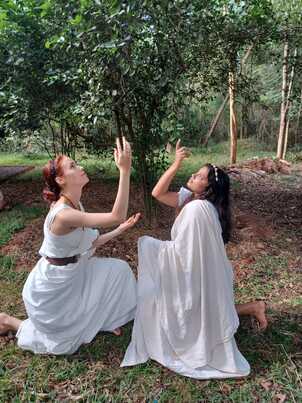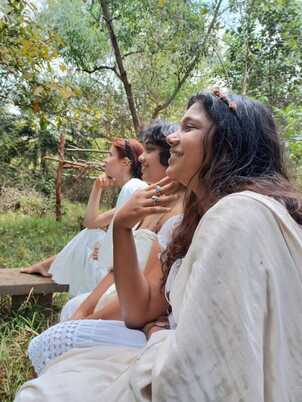Electives
Photography Class
Photography students at Future School start with the history of photography and explore traditional photographic processes such as pinhole cameras (camera obscura), photograms, and gum bichromate. Later on, they graduate to analog film photography.
The students learn to use film cameras and use film to capture their photographs. They then exercise a traditional process using chemicals to develop the negatives and use an enlarger in the darkroom to enlarge and develop their images.
Students this age are new to analogue photography as most of them were born in the digital era. Some of them get to see and handle a film camera for the first time. The idea that they have to spend time to process and develop the image as opposed to being able to see it instantaneously is novel to them. They find the whole process fascinating and are really taking to it and some of them are good at it.
Once they have mastered the technical aspects of the process, they then start using digital cameras to explore various themes concluding in finished piece/s. All the while, also using editing software's such as Photoshop, Lightroom, and Snapseed.
During the Covid years, students have mainly been working with their mobile phones to do their photography assignments. They have been exploring themes and projects such as:
The students learn to use film cameras and use film to capture their photographs. They then exercise a traditional process using chemicals to develop the negatives and use an enlarger in the darkroom to enlarge and develop their images.
Students this age are new to analogue photography as most of them were born in the digital era. Some of them get to see and handle a film camera for the first time. The idea that they have to spend time to process and develop the image as opposed to being able to see it instantaneously is novel to them. They find the whole process fascinating and are really taking to it and some of them are good at it.
Once they have mastered the technical aspects of the process, they then start using digital cameras to explore various themes concluding in finished piece/s. All the while, also using editing software's such as Photoshop, Lightroom, and Snapseed.
During the Covid years, students have mainly been working with their mobile phones to do their photography assignments. They have been exploring themes and projects such as:
- Double Exposure
- Developing their own photography styles
- Motion Blur
- Converting and using their non macro mobile cameras as a macro camera
- Storytelling through a series of images
- Using home made filters
Latin Class
This is the second year Latin has been offered as an elective. The course is meant to introduce students not only to the language but also to Roman culture. Students learn about trade, architecture and town planning while at the same time learning Latin grammar and vocabulary.
In this elective course students learn Latin through a series of fictional stories based on a real person who lived in Pompeii during the catastrophic eruption of Mount Vesuvius in 79 A.D.
In this course students often act out the stories whilst reading them in Latin, this allows our students to experience the roman mentality or at least the modern perception of it.
In this elective course students learn Latin through a series of fictional stories based on a real person who lived in Pompeii during the catastrophic eruption of Mount Vesuvius in 79 A.D.
In this course students often act out the stories whilst reading them in Latin, this allows our students to experience the roman mentality or at least the modern perception of it.
Art Class
|
|
Art & Design O and A Level Art Qualification ClassesStudents have an opportunity to explore different mediums through this qualification. Mediums such as drawing & painting, photography, graphic design, textiles, arts & crafts, and 3D art.
Once students complete their O level qualification then they can carry on to deepen their knowledge and skills with A level. They have the flexibility to complete these qualifications over one or two years based on their ability and competence. The qualification is split into two components, whereby component one theme is decided by the student in discussion with their teacher while the theme for component two is released by Edexcel. In completing the components, students have to satisfy four assessment objectives which are research, ideas, development, and final pieces. |
Film Project Class
|
|
In this class students get to watch a wide variety of films to understand and get to know the filmmaking process. They are taken through the basics of story writing, scripting, storyboarding, pre-production, production & post-production. They use post-production software such as iMovie, Final Cut Pro and Adobe Premiere to finish their individual short films.
The completed films are then screened at the next Auroville Film Festival. |


